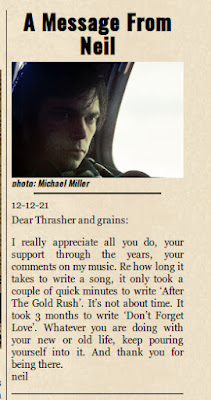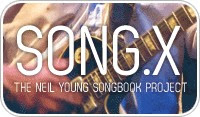Comments of the Moment: "Powderfinger" - What the Heck is that Song All About, Anyway?
Lots of interesting comments -- as usual -- on the never-ending debate over the meaning of Neil Young's "Powderfinger".
A comment by Greg M (A Friend Of Yours)
Well, after reading all 80 some comments from the link, and other interpretations over the years, I am not about to take a stab at a definitive take. I was fascinated though by some of the interpretations I never would have even begun to think of, e.g. suicide and nihilism.
Made me think.
I will say this, the name Emmy Lou tells me it is definitely the story of a white southerner. It’s an assumption, but I don’t see an Indian or black woman with the name Emmy Lou. By extension, Emmy Lou being taken by the river tells me the setting is river life somewhere in the south. Moonshiners, TVA resisters, people living off the grid, etc., or the nature and source of threat isn’t really relevant to me.
Ultimately, it’s the story of ill prepared and confused youth - could have been you or me or anyone, but for the grace of God, confronted and overcome by overwhelming forces and circumstances. Although I don’t think it’s what Neil intended. For me, 22 can also be seen as a metaphor for Man as yet still in its infancy, confronted with Life in all its complexity. The heartbreak and sadness is that the overmatched kid simply ended up on the losing end of an attempt at life that we all have to make sooner or later. It may come really early, big and fast, it may come in fits and starts, or it may just be a slow dribble over the course of a lifetime.
The question for me becomes: how have I, or will I face up to my own Powderfinger moment? 22 chose to raise the rifle to his eye instead of running, and died in regret. Was it nobleness in the act of death, or some form of foolishness? Who knows? Life, and the meaning of the life of another, like the song Powderfinger itself, can sometimes seem ambiguous. It all comes down to the individual. How are you going to make your stand? This makes me start to think about the advisability of the individual trying to take the world on by themselves, and all the alternatives to such an individual stance, but I don’t think this is what the song is about.
In the end, it seems 22 just didn’t feel like he had a lot of choice, and suffered the consequence.
Greg M (A Friend Of Yours)
From Matthew Lintzenich:
What HAVE we settled on with this? I mean, obviously there's a kid of barely 22 left alone to protect the ol' homestead, and here comes a white boat, with a red beacon, numbers on the side, a gun, and a man on the rail.
The kid obviously KNOWS that this is not good, remembers the words of his father, who told him to run when he see's red (to me, obviously this is the beacon he's referring to), decides to stand his ground anyway, uncertainly, and terrified, raises his father's rifle, and gets shot by someone on the boat.
His face splashing into the sky is the reflection of his face in the water as he's falling forward.
And he has a few last-second thoughts and regrets, and then that's it.
That's all apparently, to me, obviously correct, but if I recall the debate mostly centered on the SETTING, in terms of TIME AND PLACE, and that's where the confusion came in.
I believe that Neil made it kind of vague so it could be more universally interpreted, that is, you can put your own time and place into it so as to better identify, but I could be incorrect in that.
Neil has been vague about it, which seems to support that theory, but then again...
the names of the people (Emmy Lou and Big John) seem to indicate a very specific intent from Neil - that is, that the time and place are known to him, and are quite specific, but that, in typical Neil fashion, he leaves any direct references to that out, except for the names and description of the boat, so that we have to spend the next 30 years scratching our heads and arguing and debating about it.
heh heh heh.
So was there ever a conclusive agreement on the where/when of the song?
Still not sure what Powderfinger is really all about it?
Or -- more to the point -- what is up with the fascination of some people who analyze lyrics to Neil Young songs anyway?































 Human Highway
Human Highway

















 Concert Review of the Moment
Concert Review of the Moment





 This Land is My Land
This Land is My Land

 FREEDOM In A New Year
FREEDOM In A New Year









 *Thanks Neil!*
*Thanks Neil!*




![[EFC Blue Ribbon - Free Speech Online]](http://www.thrasherswheat.org/gifs/free-speech.gif)











 The Unbearable Lightness of Being Neil Young
The Unbearable Lightness of Being Neil Young Pardon My Heart
Pardon My Heart



 "We're The Ones
"We're The Ones  Thanks for Supporting Thrasher's Wheat!
Thanks for Supporting Thrasher's Wheat!




 This blog
This blog 
 (... he didn't kill himself either...)
#AaronDidntKillHimself
(... he didn't kill himself either...)
#AaronDidntKillHimself









































































 Neil Young's Moon Songs
Neil Young's Moon Songs




 Civic Duty Is Not Terrorism
Civic Duty Is Not Terrorism Orwell (and Grandpa) Was Right
Orwell (and Grandpa) Was Right


 What's So Funny About
What's So Funny About 



8 Comments:
I think Greg M. hits the nail on the head. The names are a hint as to the setting, and southern US folk living off the grid sounds about right. If they are moonshiners or operate some other type of underground business, then that gives the idea that this is a coast guard or police boat more credence.
They also tend to be white, and have flags and numbers on their side, guns, etc.
Also, there is the whole side-note that Neil offered this song to Lynyrd Skynyrd, which lends to that interpretation as well, as it plays right into their southern anti-hero sensibilities.
OK, I'm on board with Greg M. and Matthew L. I was always partial to the Indian theory - but, really, the names make that untenable. White Southerners, doing something unlawful. That's about right.
Charlie, in Georgia
"His face splashing into the sky is the reflection of his face in the water as he's falling forward."
I never interpreted it as that. Never thought of it.Could be though. I thought it was ("Then I saw black" - was that HIS shot/pwder in his eyes?) metaphorical as in his life was blown away and the splash was his soul releasing to the heavens. Hmmmm. I guess we can do this a hundred times or more. But then again, numbers add up to nothhin'!
Oh yes, there is the issue of him seeing black PRIOR to the face-splashing, so that lends credence to Sony's POV as well.
So I wouldn't discount that. I simply like the more direct interpretation of the reflection in the water as the last thing he sees.
In a strict linear time-frame sense, if we are to take Neil at face-value here, and the black does come first, then perhaps it is his own gun misfiring.
"When the first shot hit the dock I saw it coming,"
comes a few lines before that, which leads me to believe he was fired upon, but perhaps they missed, and it was his own, rusty old gun that did him in?
Makes sense. And makes the whole story a bit more peculiar, which would be very like Neil in any case.
Jeez, of all the songs he's written I can't believe there's a discussion about what this song means. It's among the most concrete detailed stories he's ever written.
Tell me what 'Pocahontas' is about though. Now there's a story full of mystery and strangeness.
Like Cortez, Powderfinger seems to be a metaphor for a failed relationship. Neil's use of death to portray a love gone bad is reflective of what he experienced throughout the seventies. The final lines: "Think of me as one you never figure, Who'd fade away so young, With so much left undone
Remember me to my love, I know I'll miss her" followed by that incredible guitar lick gives it away.
Like so many of his songs (and many great poets), he constructs a very detailed story full of characters, events and vivid imagery to make a statement about love and love lost. By 74-75 (when I believe Powderfinger was written), Neil had been through the trauma of family deaths (Danny and Bruce), the repeated break-ups of CSNY, and the end of his storybook marriage with Carrie Snodgrass. Is it any wonder that in his songwriting Neil would use death as metaphor for the people in his life abandoning him (as well as his abandonment of those very same people)?
Just look at the songs he was writing during this period, My My Hey Hey, Cortez, Dangerbird, and the ultimate death song, Thrasher and it becomes clear that separating Neil Young the man, from Neil Young the artist is impossible.
Yeah, there's more than meets the eye with Neil.
setlist thief makes some interesting points: Powderfinger as Cortez the Killer, or (to me) Joni's Big Yellow Taxi- an elaborate weaving of a cover story to hide or obfuscate the real issue bothering the songwriter, lost love. I can't say I agree or disagree, because I didn't write the song, but it still conforms with a couple of things in my mind.
One, that the nature of threat, or angst, is irrelevant. It's ultimately about "... ill prepared and confused youth... confronted and overcome by overwhelming forces and circumstances.", just fill in the blank. And two, just fill in the blank. As so many people have pointed out, by interpreting the lyrics according to what you think Neil means, or what it means to you, the object of putting the song out there for people to interpret in their own way is served. Even though it means one (or many) things to me, doesn't invalidate that it might be about Vietnam or revolutionary America or suicide or nihilism, or whatever, to other people.
This is why it's so difficult to posit a definitive take on the song, outside of Neil coming out and breaking it down for everyone, assuming of course that he has a definitive take on it himself. I think it's enough that the song causes a discussion or thought process that reveals interpretations that open up the mind and heart in ways they otherwise would not have been.
Greg M (A Friend Of Yours)
Greg M., I can certainly appreciate your comments especially "it's enough that the song causes a discussion or thought process that reveals interpretations that open up the mind and heart in ways they otherwise would not have been."
Well said.
On the '99 tour, Neil introduced Homegrown as "this little song that used to be about smoking dope, but then the world changed, and now it's a protest song," referring to organic farming. A song's meaning changes over time of course as we, and the world, grow and change. Neil has also said there are songs he won't perform now because "I'm not that person anymore."
I really don't know or care what Neil meant Powderfinger to be about when he wrote it. But I do now that it's a great folk song with lyrics that mean something, and a killer guitar riff of which I never tire!
Post a Comment
<< Home